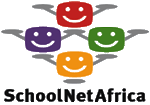ICT Policies
We rely on our governments and policy makers to make ICT policy choices that will make technology affordable and accessible to all. In this section we focus on the process of eGovernance, it's use in speeding delivery, especially in advancing education for all goals in Africa.
Schoolnet Africa Supports FOSSFA's Capacity Building Initiatives - 2004 Jan 22
At the recently concluded First African Conference on the Digital Commons - Idlelo 2004 in Cape Town, South Africa it was acknowledged that the greatest challenge to the effective use of open source software in Africa was the lack of capacity and the need to build support structures all over the continent.
Source: SchoolNet Africa
SCAN-ICT: Indicators of Information and Communications Technologies (ICT)
Elaborate on the kind of opportunities available to build the capacity for Africa to influence ICT investments, to increase their impact, and to encourage development of "made in Africa", solutions, applications and content. Baseline Scan-ICT studies on Ethiopia, Ghana, Mozambique, Morocco, Senegal and Uganda.
Source: UNECA [1281]
ScanICT.pdf
E-Strategies: National, Sectoral and Regional ICT Policies, Plans and Strategies
This report assesses the state of national and regional ICT policies, plans and strategies. It focuses on the role of ECA and summarizes major regional and global initiatives being undertaken in or relevant to Africa. It also highlights new applications and initiatives in key sectors, and concludes with lessons learned and the way forward.
Source: [1276]
E-Strategies.pdf
Fostering the capacities of the Ethiopia civil society to influence ICT policies
This paper presents the case of civil society organizations in Ethiopia and discusses how their involvement in ICT policy process can be improved. Although recent initiatives by the Federal Government in modernizing its ICT policies and the opening up the telecommunication sector present windows of opportunities for the civil society to participate in the policy process, the inherent weakness of the civil society due to the spread of its efforts along dozens priorities aimed at responding to the on-going social and economic crisis in the country makes the participation in ICT policy process rather difficult. The weakness of formal institutions and the uncertainties that characterize public policy making in the country have also a considerable impact on the participation of the civil society in policy processes and policy implementation.
Source: APC [1241]
Fostering_the_capacities_of_the_Ethiopia_civil_society_to_influence_
ICT_policies.pdf
SNA Policy on technology choice, open standards, proprietary and open source software
SchoolNet Africa (SNA) endeavours to improve education access, quality and efficiency through the use of information and communication technologies (ICT) in African schools. SchoolNet Africa works mainly with learners, teachers, policymakers and practitioners through country-based SchoolNet organisations across Africa.
Source: SchoolNet Africa [1174]
policy_on_technology_choice.pdf
Politique_sur_le_choix_des_technologies.pdf
Malawi Communication Sector Policy
The policy aim is to ensure that a full range of modern services is accessible by all the population of Malawi. To achieve this aim, the policy focuses on the efforts of service providers more closely and need to restructure existing institutions in the sector in order to meet challenges that lie ahead.
Source: Malawi Ministry of Communication [1078]
Malawi_Communication_Sector_Policy.pdf
Rural_Telecommunications_strategy.pdf
Tanzania ICT Policy
Tanzania has made remarkable progress in deploying ICT. This progress has been well received by the citizens and service providers who are striving to address unmet demand and competition in newly liberalised markets.
Source: Tanzania Ministry of Communication and Transport [1076]
Tanzania_National_ICT_Policy.pdf
Telecommunications Reform in Uganda
The case study is part of a larger research program analyzing the effects of regulatory, legal, political and bureaucratic institutions on telecommunications reforms in Africa.
Source: World Bank Policy Research Working Paper [1029]
Telecommunications_reform_in_Uganda.pdf
South Africa - Department of Education
Polices and documents related to education in South Africa. [541]
http://education.pwv.gov.za/
Education in Ghana
Ghana has 12,130 primary schools, 5,450 junior secondary schools, 503 senior secondary schools, 21 training colleges, 18 technical institutions, two diploma-awarding institutions and five universities serving a population of 17 million; this means that most Ghanaians have relatively easy access to good education. In contrast, at the time of independence in 1957, Ghana had only one university and a handful of secondary and primary schools. In the past decade, Ghana's spending on education has been between 28 percent and 40 percent of its annual budget.
Source: DFID [540]
http://www.dfid.gov.uk/AboutDFID/Education/Research/Library/
contents/dep27e/ch05...


